holy sonnet 10
Death_be_Not_Proud 死亡,不要骄傲解读
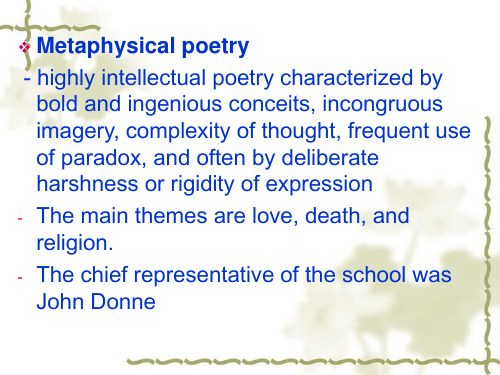
你是命运、机会、君主、亡命徒的奴隶,
And dost with poyson, warre, and sicknesse dwell,
Characteristics of his poems: dazzling wordplay, often explicitly sexual; subtle argumentation; surprising contrasts; colloquial language; irregular meter; intricate psychological analysis; and striking imagery selected from nontraditional areas such as law, physiology, scholastic philosophy, astronomy and mathematics which endow his poems with learning and wit and also make them difficult to understand.
你以为你把谁谁谁打倒了,其实, 可怜的死神,他们没死;你现在也还杀不死我。
From rest and sleep, which but thy pictures be, Much pleasure, then from thee, much more must flow,
(Sleep is just a picture of death)
-Leabharlann Conceit is an elaborate, often extravagant metaphor making an analogy between totally dissimilar things. Love is a spider which dropped into the wine of life, turns it to poison.
No.14 邓恩《圣十四行诗10》
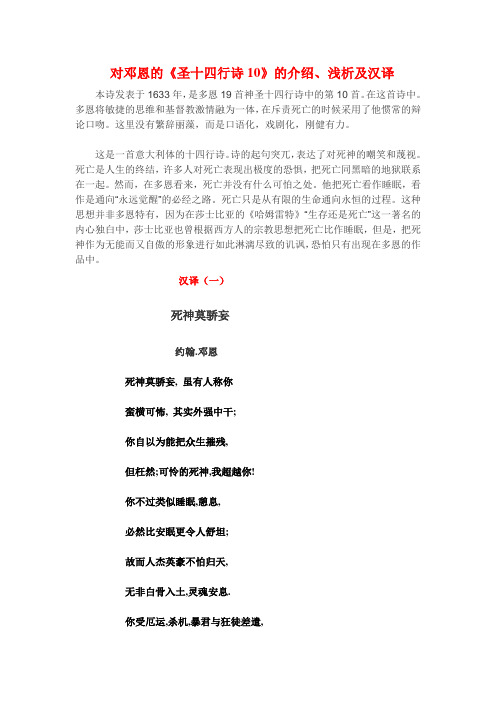
对邓恩的《圣十四行诗10》的介绍、浅析及汉译本诗发表于1633年,是多恩19首神圣十四行诗中的第10首。
在这首诗中。
多恩将敏捷的思维和基督教激情融为一体,在斥责死亡的时候采用了他惯常的辩论口吻。
这里没有繁辞丽藻,而是口语化,戏剧化,刚健有力。
这是一首意大利体的十四行诗。
诗的起句突兀,表达了对死神的嘲笑和蔑视。
死亡是人生的终结,许多人对死亡表现出极度的恐惧,把死亡同黑暗的地狱联系在一起。
然而,在多恩看来,死亡并没有什么可怕之处。
他把死亡看作睡眠,看作是通向“永远觉醒”的必经之路。
死亡只是从有限的生命通向永恒的过程。
这种思想并非多恩特有,因为在莎士比亚的《哈姆雷特》“生存还是死亡”这一著名的内心独白中,莎士比亚也曾根据西方人的宗教思想把死亡比作睡眠,但是,把死神作为无能而又自傲的形象进行如此淋漓尽致的讥讽,恐怕只有出现在多恩的作品中。
汉译(一)死神莫骄妄约翰.邓恩死神莫骄妄, 虽有人称你蛮横可怖, 其实外强中干;你自以为能把众生摧残,但枉然;可怜的死神,我超越你!你不过类似睡眠,憩息,必然比安眠更令人舒坦;故而人杰英豪不怕归天,无非白骨入土,灵魂安息.你受厄运,杀机,暴君与狂徒差遣,用毒药,战争和疾病害人;鸦片与妖术也能使人昏,且更灵验,你何必如此气焰!凡人了却浮生,但精神永生,超脱死的魔掌,灭绝死神!从诗的结构来看,第一、二行“死亡,不要骄傲,虽然有人说你/强大而又可怖,而你并不真的这样”,是论点,而第二行到第八行是论据,说明死亡没有什么可怕,死亡同睡眠没有多少不同,都可以使人“获得身体的休息,灵魂的解脱”。
第九、十行指出死神的无能,而第十一、二行说明死神并没有什么独特之处,没有什么可资骄傲的理由。
这四行进一步提供论据,来支持诗人的论点。
第十三、四行则是结论。
虽然这首诗有很强的论说性,但表达了诗人对死神的蔑视和无畏之情。
情与理的结合使诗本身具有有说服力,而比喻的运用使这篇说理的诗生动。
整个诗作铿锵有力,富于阳刚之气。
Holy Sonnet 10

Holy Sonnet 10--Death, to be not proudThe poem is addressed to physical death which poet thinks is not frightening. And then the poem explains why death is not afraid worthy. Within those words there are several themes.From line one to line four, poet presents his different attitude towards death and shows his courage. Death is mighty and dreadful, and can kill people freely to some people, but poet overthrow the impression. Poet tells death not to proud, and he even calls death a poor death. The so-called mighty death thinks he has the power to kill people, but actually he does not. But how could death be death without the power of killing. Poet quotes the definition of death in the Bible. The Bible describes death as separation: physical death is the separation of the soul from the body, and spiritual death is the separation of the soul from God. The death in the poem is physical death. Death can not kill people, because death can not destroy the spiritual life.From line five to line eight, poet compares the death to rest and sleep, and presents the death of best men. Rest and sleep brings pleasure to people, but death can bring more pleasure than rest and sleep. So, there is no reason for people to afraid of death. After the best men followed with death, their physical bodies get pleasant rest and their spiritual life just begin.From line nine to line twelve, poet introduces the methods that death uses to kill people physically. Death only is a hatchet man for fate, chance, kings, and separate men. Fate is thought to control everything happens to people, including when shouldone dies. Chance is the opposite of fate. Chance is luck, the possibility of things that will happen to someone. Kings are from different perspective. Kings are real power in human world, but they can also have the power to decide one’s life. Desperate men have no power to control their fates; they have no chance or power. However, desperate men can make a suicide choice. They have the rights to control their own life. Poison, war, sickness dwell, poppy and charms are the methods death uses to kill people.In the line five and six, poet compares death to rest and sleep. In the line thirteen, “the short sleep past” means the physical death past; “we wake eternally” means our spiritual life just begins. During this piece of work, John Donne had suffered a major illness during his eighth year as an Anglican minister that had brought him close to the grasp of death. The last line was an announcement to show poet’s determination and courage.There are three themes within the fourteen lines: courage, death and wish.Courage is the obvious theme in the sonnet. Throughout the entire poem, poet never drops his guard. Call death a poor death; compare death with rest and sleep; list the methods death uses to kill physical life are the expressions of courage against death. Poet belittles the power of death to show others that he is brave, and he has the courage to fight against it.Death always can be a topic for poem. Western people treat death in a religion way. Death has its religion meanings in west. In Christian world, death has two aspects: physical death and spiritual death. In poet’s mind the physical death can onlytake body away, and the spiritual life will get eternity. According to poet, death is working for fate, chance, kings and desperate men, and it has many ways to kill people physically. But when someone gets strong enough, no one can bring death to him or her.The last line of the poem shows the poet’s determination of living. He believes death is dead in spiritual world. The sickness may take poet’s physical life away, but his spirit will never lose. The wish in the poem is to defeat death and find the eternal spirit. Eternal spirit is about faith. The faith contains courage and wisdom.This poem is an announcement from poet to show that he has the determination to fight against death by expressing his own attitude which exposes a truth that death has no need to be afraid.。
邓恩 圣十四行诗之10

Pitying death
Thou art slave to Fate, chance, kings, and desperate men, And dost with poison, war, and sickness dwell, And poppy, or charms can make us sleep as well, And better than thy stroke; why swell'st thou then ?
Death believes that he is defeating men when he takes them, that 死神,你莫骄横,尽管有人将你看得 Donneconquering, “poor Death”, who is soInstead,to think himself a bane is, is mocking ruining, 如何强大,如何可怖,你呀,名不符实; causing to fall. silly as he does not cause 你自以为已经把芸芸众生毁灭, them on man's helps themis personified. is the is sayingkill me", In the fall, stanza, Death to again, "nor yet canst thou (祸根)to first but existence. Andrise—deathDonne means by which turns back toDeath tends to regard himself eternal lifebut brings new and immortal that the same idea that 可怜的死神,他们没死.你至今还杀不死我; Death does powerful and man finds Resurrection(复活), asnot kill, and immortality life.throughcannot killheaven. people have called him that. terrifying,Christ in him, thus he holds no power over him. Death and indeed some But Death has nothing to be proud, which is explained in the next lines.
世界最经典10首爱情诗歌
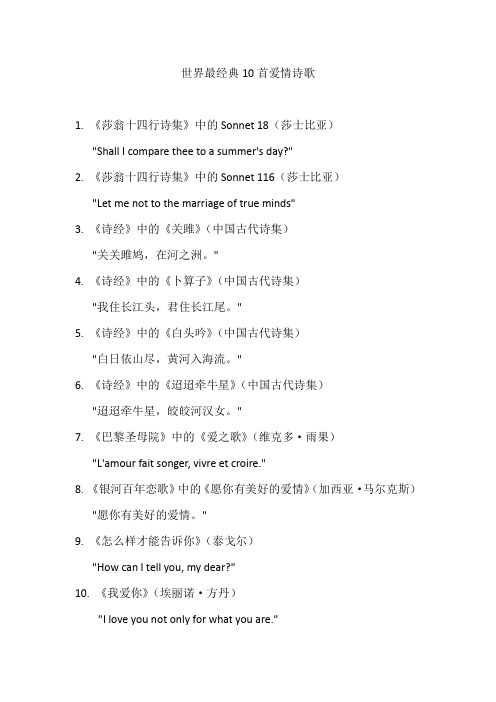
世界最经典10首爱情诗歌
1. 《莎翁十四行诗集》中的Sonnet 18(莎士比亚)
"Shall I compare thee to a summer's day?"
2. 《莎翁十四行诗集》中的Sonnet 116(莎士比亚)
"Let me not to the marriage of true minds"
3. 《诗经》中的《关雎》(中国古代诗集)
"关关雎鸠,在河之洲。
"
4. 《诗经》中的《卜算子》(中国古代诗集)
"我住长江头,君住长江尾。
"
5. 《诗经》中的《白头吟》(中国古代诗集)
"白日依山尽,黄河入海流。
"
6. 《诗经》中的《迢迢牵牛星》(中国古代诗集)
"迢迢牵牛星,皎皎河汉女。
"
7. 《巴黎圣母院》中的《爱之歌》(维克多·雨果)
"L'amour fait songer, vivre et croire."
8. 《银河百年恋歌》中的《愿你有美好的爱情》(加西亚·马尔克斯)
"愿你有美好的爱情。
"
9. 《怎么样才能告诉你》(泰戈尔)
"How can I tell you, my dear?"
10. 《我爱你》(埃丽诺·方丹)
"I love you not only for what you are."。
十四行诗英汉双语Sonnets1-10

From fairest creatures we desire increase,That thereby beauty's rose might never die,But as the riper should by time decease,His tender heir might bear his memory;But thou, contracted to thine own bright eyes,Feed'st thy light's flame with substantial fuel,Making a famine where abundance lies,Thyself thy foe, to thy sweet self too cruel.Thou that art now the world's fresh ornamentAnd only herald to the gaudy springWithin thine own bud buriest thy content,And, tender churl, mak'st waste in niggarding.Pity the world, or else this glutton be:To eat the world's due, by the grave and thee.By William Shakespeare(威廉莎士比亚)一我们总愿美的物种繁衍昌盛,好让美的玫瑰永远也不凋零。
纵然时序难逆,物壮必老,自有年轻的子孙来一脉相承。
而你,却只与自己的明眸订婚,焚身为火,好烧出眼中的光明。
你与自我为敌,作践可爱的自身,有如在丰饶之乡偏造成满地饥民。
你是当今世界鲜美的装饰,你是锦绣春光里报春的先行。
你用自己的花苞埋葬了自己的花精,如慷慨的吝啬者用吝啬将血本赔尽。
英国文学John Donne the flea
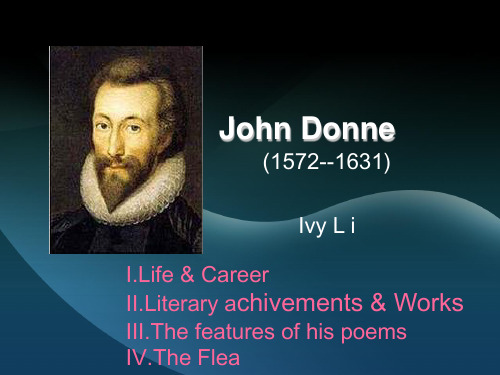
Life & Career
b)1601 was the turningpoint to Donne.In 1601, he
secretly married his employer's niece, seventeen-year-old Anne More, daughter of Sir George More, and effectively committed career suicide. Donne was thrown in Fleet Prison by Sir George for some weeks, and then was dismissed from his post, and for the next decade had to struggle near poverty to support his growing family.These were bitter years for a man who knew he could have risen to the highest posts, and yet found no preferment. It was not until 1609 that a reconciliation (和解) was effected between Donne and his father-in-law.
史上最伟大的10首英语爱情诗你读过几首
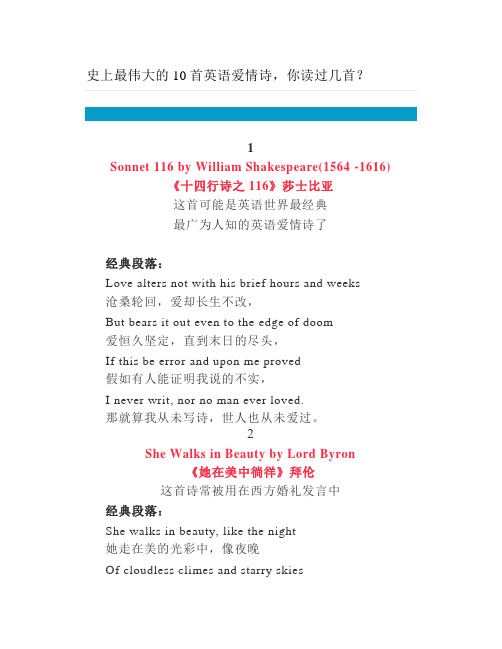
史上最伟大的10首英语爱情诗,你读过几首?1Sonnet 116 by William Shakespeare(1564 -1616)《十四行诗之116》莎士比亚这首可能是英语世界最经典最广为人知的英语爱情诗了经典段落:Love alters not with his brief hours and weeks沧桑轮回,爱却长生不改,But bears it out even to the edge of doom爱恒久坚定,直到末日的尽头,If this be error and upon me proved假如有人能证明我说的不实,I never writ, nor no man ever loved.那就算我从未写诗,世人也从未爱过。
2She Walks in Beauty by Lord Byron《她在美中徜徉》拜伦这首诗常被用在西方婚礼发言中经典段落:She walks in beauty, like the night她走在美的光彩中,像夜晚Of cloudless climes and starry skies皎洁无云而且繁星漫天;And all that's best of dark and bright黑夜与白天最美妙的色彩;Meet in her aspect and her eyes都在她的面容和目光里显现。
3I loved you first: but afterwards your love... byChristina Rossetti《虽然我先爱你》罗塞蒂经典段落:I loved you first, but afterwards your love outsoaring mine虽然我先爱你,但后来你的爱却超越了我,For one is both and both are one in love因为真爱不分你我,Rich love knows nought of ‘thine that is not mine 丰盛的爱不分彼此;Both have the strength and both the length thereof 所以我们才有力量走向永恒,Both of us, of the love which makes us one你和我,因为爱,成为一体。
- 1、下载文档前请自行甄别文档内容的完整性,平台不提供额外的编辑、内容补充、找答案等附加服务。
- 2、"仅部分预览"的文档,不可在线预览部分如存在完整性等问题,可反馈申请退款(可完整预览的文档不适用该条件!)。
- 3、如文档侵犯您的权益,请联系客服反馈,我们会尽快为您处理(人工客服工作时间:9:00-18:30)。
死神,你莫骄傲死神,你莫骄傲,尽管有人说你如何强大,如何可怕,你并不是这样;你以为你把谁谁谁打倒了,其实,可怜的死神,他们没死;你现在也还杀不死我。
休息、睡眠,这些不过是你的写照,既能给人享受,那你本人提供的一定更多;我们最美好的人随你去得越早,越能早日获得身体的休息,灵魂的解脱。
你是命运、机会、君主、亡命徒的奴隶,你和毒药、战争、疾病同住在一起,罂粟和咒符和你的打击相比,同样,甚至更能催我入睡;那你何必趾高气扬呢?睡了一小觉之后,我们便永远觉醒了,再也不会有死亡,你死神也将死去。
Many of the poems are believed to have been written in 1609 and 1610, during a period of great personal distress and strife for Donne who suffered a combination of physical, emotional, and financial hardships during this time. This was also a time of personal religious turmoil as Donne was in the process of conversion from Roman Catholicism to Anglicanism, and would take holy orders in 1615 despite profound reluctance and significant self-doubt about becoming a priest. In Holy Sonnets, Donne addresses religious themes of mortality, divine judgment, divine love, and humble penance while reflecting deeply personal anxieties.第一组四行诗以拟人的手法呼吁死神不要骄傲,(“Death, be not proud”)起句突兀,表达了对死神的嘲笑和蔑视,然后立刻指出死神不应骄傲的第一条理由:For those, whom thou think’st thou dost overthrow, Die not, poor Death, nor yet canst thou kill me.”第二组四行诗指出死神无需骄傲的另一条理由:死亡不过是更安逸的休息、更甜美的睡眠,“Much pleasure, then from thee much more must f low,”人们都会争着希望得到身体的休息,灵魂的解脱,“Rest of their r bones, and soul’s delivery.”第三组四行诗嘲笑死神奴隶般的从属地位:“Thou’rt slave to Fate, chance, kings, and desperate men, And dost with poison, war, and s ickness dwell,”并以罂粟和咒符来衬托死神的无能为力:“And poppy or charms can make us sleep as well, And better than thy stroke”既然这样,你何必趾高气扬呢?“why swell’st thou then?”这三组四行诗以不同的理由对死神威胁的解构确实已非同一般。
然而,接下来的偶句并不放过对死神的最后一击:睡一小觉之后,我们便永远觉醒了,再也不会有死亡,不可一世的死神将走向自身的死亡,“And Death shall be no more; Death, thou shalt die.”诗歌的说理递进模式在此戛然而止,生与死原有意义上的关系彻底逆转:死亡是瞬间的,将很快不复存在,而死后的欢乐则是永恒的,人对于死亡的畏惧变成了死亡自身的恐惧,死亡对于人来说不过是通往幸福永生的大门。
In this poem, Donne uses a variety of poetic elements. These elements function in enhancing the work’s unconventional them e of man's superiority over death.Throughout the poem, there is a strong use of assonance, the repetition of vowel sound within a phrase. The sound of the words helps in structuring Donne's writing. Nearly every line contains a repetition of "o" sounds. In the following line, an example of this device is clear: “Die not poor Death, nor yet canst thou kill me." The frequent use of assonance does not directly enhance the poem's theme, yet it does help convey its message more vividly by making the lines flow, thus allowing the reader to understand each stanza more easily. Since each individual line and its associated thought are easy to understand, the central idea of the entire poem is easy to understand too.John Donne effectively uses tone to enhance the poem's theme. The work has a tone of triumphant confidence and defiance in the face of death. Donne boldly denounces death, making it clear that he is not controlled by the fear of it as others often are. Although many may believe death to be mighty and dreadful, he feels this is not so. Donne sees death as being dependent on mankind for its survival. Death relies on fate, chance unfortunate occurrences, the legislation of kings, and the actions of desperate men to claim its victims. This dependence in itself is a weakness, in that death is not self-supporting, yet relies on certain aspects of the lives of people. Donne's final and most derogatory comment comes in the poem's final lines where he portrays death as nothing more than a transition into an eternally vast afterlife; Death is a short sleep from which we wake forever. It is nothing to fear in this situation. And, in this afterlife, death no longer exists or poses a threat. Death itself dies. All of these examples of Donne's use of tone greatly enhance the poem's theme that man is superior to death. Death's intimidation is diminished as he points out its weaknesses one by one and bravely faces it head on.It is also something not commonly personified and spoken to. The combination of a personified Death and the reference to it by means of apostrophe is very effective and crucial to the poem's theme. Donne is better able to profess (openly declare) his superiority over death by showing it as a human adversary, capable of defeat, rather than an uncontrollable natural force. His desire to prove his freedom from the imprisonment of fear is visible in the angry and arrogant monologue he presents to death in his poem. Donne’s feeling s are better expressed in a situation which people can relate to — a confrontation in which one party addresses another. The superiority theme is enhanced as a result of this man-versus –man conflict depiction.死亡是瞬间的,将很快不复存在,而死后的欢乐则是永恒的,人对于死亡的畏惧变成了死亡自身的恐惧,死亡对于人来说不过是通往幸福永生的大门。
